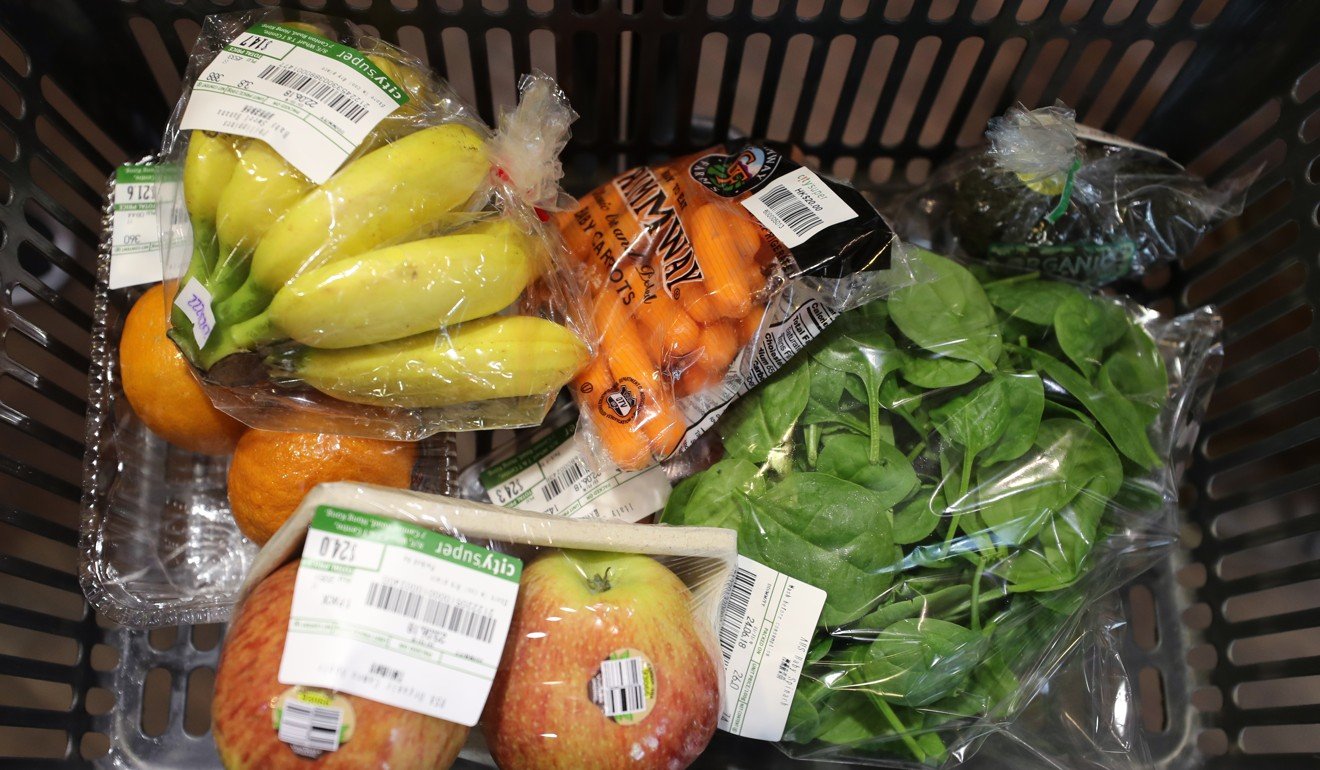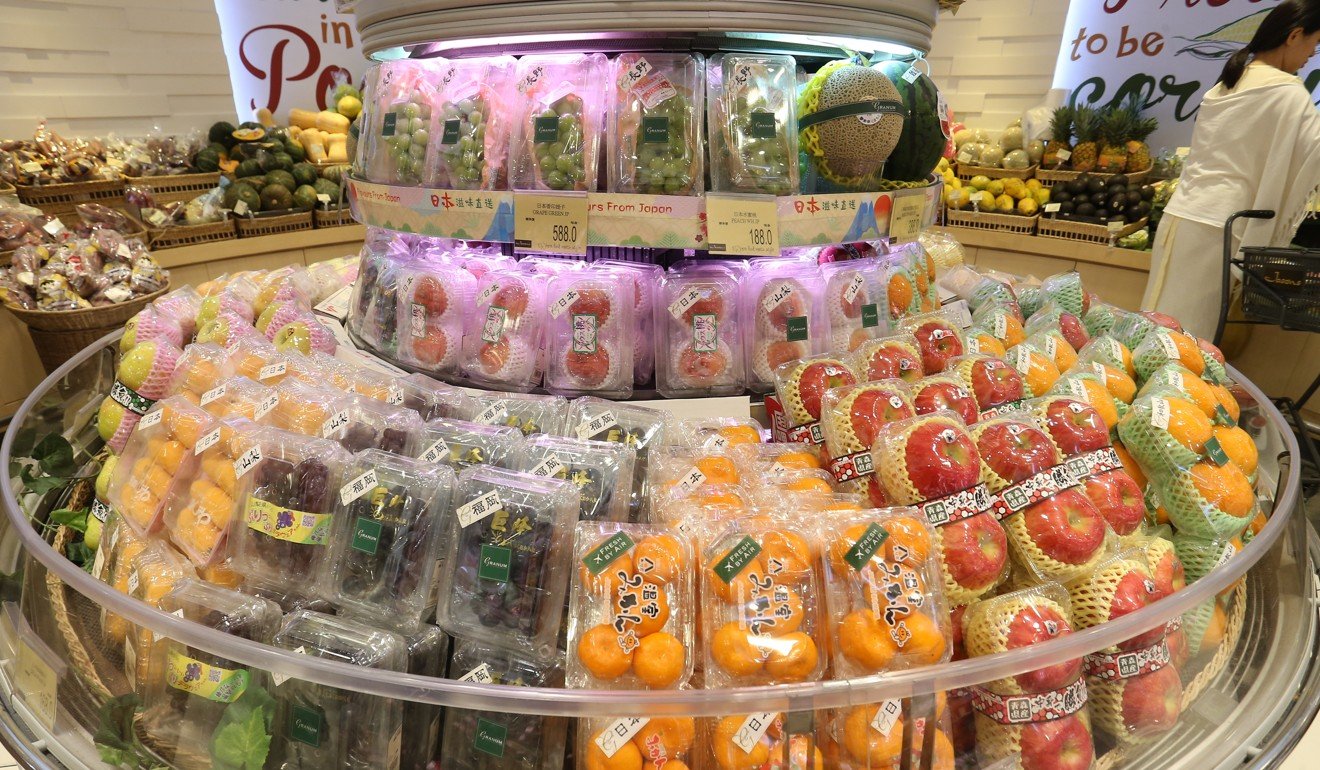
Are Hong Kong supermarkets using too much plastic? Greenpeace slams chains for wasteful packaging
- Survey shows most consumers put responsibility of reducing single-use plastics squarely on shoulders of retailers
- 70 per cent of respondents prefer shopping in supermarkets that stripped off unnecessary and wasteful plastic
Mangoes encased in so much plastic wrap that unpacking one is akin to peeling off multiple layers of onion skin, plastic bottles of fruit juices that come in yet another plastic bag, and hardy items such as pineapples and coconuts covered in useless cling film.
These are just a few glaring examples raised by a green group to highlight Hong Kong’s consumption problem and its wasteful use of plastic.
On Friday Greenpeace released poll results showing that 70 per cent of respondents prefer shopping in supermarkets that stripped off unnecessary and wasteful plastic wraps.

About 90 per cent of those polled put the responsibility of reducing single-use plastics squarely on the shoulders of supermarkets, while 63 per cent agree the problem of unnecessary packaging in supermarkets is severe or very severe.
The survey was conducted in April by Shue Yan University, involving interviews with 1,000 Hongkongers who had shopped in supermarkets over the past month.
“We define the problem as unnecessary packaging, it’s not about one or two, or how many layers of plastic wraps, but whether they are necessary in serving a justified purpose such as protecting perishable products,” Chan Hall-sion, a Greenpeace campaigner said.
It’s not about one or two, or how many layers of plastic wraps, but whether they are necessary in serving a justified purpose such as protecting perishable products
The environmental NGO said on average annually, 409 tonnes of the city’s discarded plastic packaging go into the sea, posing significant health risks as the micro plastic particles find their way into the food chain and back on dinner tables.
In 2017, Hong Kong’s landfills received 2,124 tonnes of plastic waste daily, a slight drop from 2,132 tonnes in 2016 and 2,183 tonnes in 2015, representing about 20 per cent of total municipal solid waste collected.

In response to a Post inquiry, supermarket chain City’super said they had been gradually reducing the amount of pre-packaged fruits and vegetables by introducing more loose sales.
They said different packaging methods were used, depending on the level of fragility, storage and protection need. The chain said that for example, ready-to-eat salad vegetables required individual packaging to maintain quality and hygiene.
Another chain Wellcome said they were “actively seeking sustainable ways to use less and waste less”.
ParknShop said 90 per cent of fresh produce sold at its stores were imported, and that it was “actively working with suppliers to see ways to reduce plastic packaging without damaging quality”.
It said it was also considering using recyclable packaging for highly perishable products.
The supermarket giant cited its own research, involving interviews with 900 customers in March, that found 50 per cent prefer pre-packaged vegetables because of hygiene considerations.
Nonetheless, ParknShop said it would run pilot plastic-reduction measures at three stores in local universities such as the University of Hong Kong next week. Under this initiative, fresh produce such as apples and oranges would be sold in loose form. The chain intends to review results to determine if the scheme should be extended to more stores.
Japanese chain Aeon did not respond by press time.
But Greenpeace’s Chan dismissed the explanations and said that during their investigation on 11 chain stores, it was discovered that some fruits were only given plastic wraps after they arrived at store branches.
Chan added that wrapping mangoes in plastic actually caused customers a great deal of inconvenience as they could not inspect or smell the fruit before purchase.

Greenpeace said some simple steps could be taken immediately to incentivise buyers to choose plastic-free products. Suggestions included giving out cash rewards or setting up a separate shorter queue at the cashier for such buyers.
The green group also demanded that supermarket giants disclose their plastic usage, and set a timetable and road map for phasing out plastic entirely.
“We have done the homework for the supermarkets showing that an overwhelming percentage of their customers actually want a plastic-free shopping experience. There’s no reason why they can’t do it,” Chan said.
